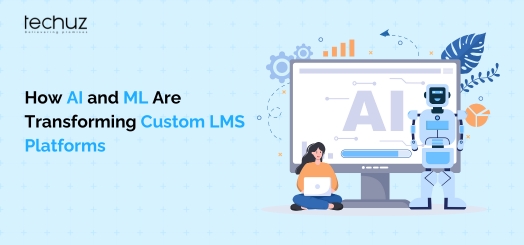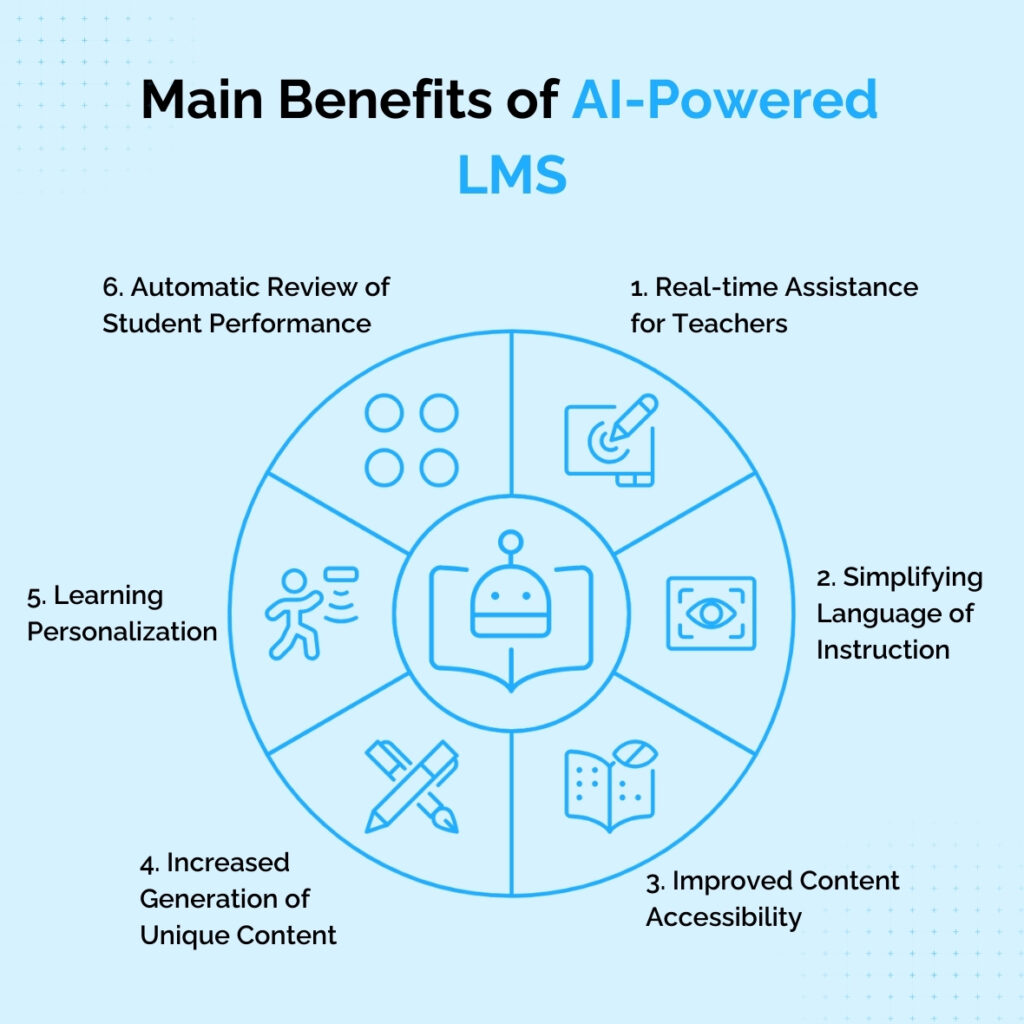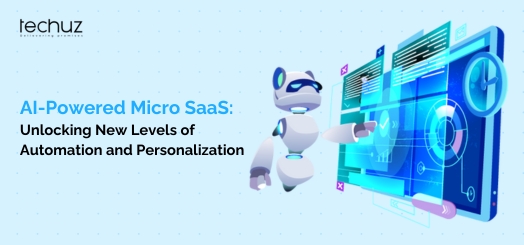Posted on
November 25, 2024
Read time
 11 mins read
11 mins read
The application of Artificial Intelligence and Machine Learning in the development of Custom Learning Management Systems is changing the face of education and corporate training. These approaches are improving the effectiveness, customization, and growth of the learning management system technologies making them more intelligent, flexible and swift for both the learner and the teacher. With the advent of newer technologies, organizations and educational institutions with the aim of offering quality services, have embraced custom LMS development with the incorporation of AI and ML.
This paper aims to analyze how Artificial Intelligence in LMS and Machine Learning in LMS development are enhancing the capabilities of bespoke systems with a special emphasis on personalized learning, learner engagement and administrative tasks filtration and assist in forecasting the trends in LMS development in a world dominated by cognitive computing.
Table of Content
1. The Rise of AI and ML in Custom LMS Platform
What is AI and ML in LMS?
Within the parameters of Learning Management Systems, it becomes crucial to firstly highlight the importance of Artificial Intelligence and Machine Learning and subsequently discuss their relevance in LMS respectively – the ‘what’ and the ‘when’
Machine Learning is a division of Artificial Intelligence which focuses on making machines capable of learning without programming them to do so. In Learning Management Systems, Systems based on Machine Learning can study the historical data of the students, predict their performance, suggest contents, and cater to the individual learning patterns of the learner.
Thanks to AI and ML, customized learning management systems (LMS) are no longer flat systems – they have become sophisticated and intelligent systems capable of delivering supported learning experiences based on heavy personalization and rich data inputs.
Personalized Learning Path
• Tailored Content Delivery
Employing AI in LMS is capable of making one of the most prominent features in these systems- assistance in designing personalized learning paths. Usually, traditional LMS solutions focus on a singular means of content delivery for all learners, which in turn causes boredom more so for those with different levels of competency. On the other hand, machine learning LMS will profile each learner, their performance, how often they behave and even their preferences and content will be designed for each learner.
For instance, if a student has difficulties understanding specific concepts, the LMS could suggest auxiliary materials or deeper lessons to ensure the student understands the concepts before advancing. In contrast, if the learner has a dominating ability for any skill, the system will offer higher-level content to the learner in order to sustain their interest.
This flexible feature guarantees that learners will always take the path that best fits their pace and requirements leading to better performance and higher rates of engagement.
• Data Driven Recommendations
AI integrated learning management systems can recommend courses due to the user’s history order. Such systems keep track of activities performed by a learner, i.e., quiz performances, time taken for each module, and even completion rates, and process those statistics. Therefore, the AI can recommend courses, activities or even supplementary resources that are appropriate to the learner’s objective.
For example, if a learner demonstrates keen interest in specific subjects, the system may suggest advanced lessons or offer more related fields to boost their skills properly. Such recommendations foster self-regulation among the learners and create a more encouraging and active learning environment.
2. Improved Learner Involvement and Retention
• Gamification as well as Interactive Features
LMS with AI is progressively adopting gaming elements in the learning process to enhance the students’ interest. Learners get to find education to be enjoyable and interactive through features like badges, leaderboards, and achievements with the help of gamification. Based on the learner’s progress and achievement, AI can adjust the gamified elements so that the learner is challenged, but not over-challenged.
In LMS, machine learning tools can also track the users’ use of such interactive features and improve the design of these features. For instance, when the learner seems to prefer a certain category of activity, which they are willing to complete, the LMS can offer more such engaging activities, making the learner stay focused on the course content.
• Adaptive Learning
The Learning Management System (LMS) is equipped with another important aspect of AI, which is adaptive learning. This technology adapts the content difficulty-level and its speed to the learner in real-time using an ‘adjustable’ set of content management machine learning algorithms or simply level of algorithms. Adaptive learning makes sure that no learner is overwhelmed with very difficult content or disinterested with content that is too simple. The system modifies the educational process by redirecting attention to how the learning experience for each individual is organized, a flow that is appropriate to the individual’s pace of progression.
For instance, a scenario in which a student finishes a topic with understanding within a short period of time the LMS will then give the student an advanced level of that topic or a more complex task in order for the student to continue learning. This guarantees that learners are constantly kept busy and challenged enough resulting in increased comprehension of the knowledge gained.
• Virtual Tutors and Chatbots
The use of artificial intelligence based chatbots and virtual tutors has proven to be a very effective strategy to enhance learner’s interaction in any custom LMS. These tools also enable practitioners to elicit and give feedback, to provide instruction, and to help the learner understand complex issues. A virtual tutor is able to create an experience of personal conversations, which gives the learner the opportunity to receive support whenever needed, even if the classes are over, unlike regular teaching.
For example, when a learner wants to know something about a specific subject, he or she can just ask the virtual AI chatbot, who will explain the topic as thoroughly as possible or point to the appropriate literature which will explain it. This however helps in reducing the timeline and brings better satisfaction to the learner and keeps them active.
3. Automating Administrative Tasks
• Using Artificial Intelligence for Administration Efficiency
LMS AI provides numerous benefits for users, including the integration of technology in their learning environment management, as well as automation of basic administrative functions. Educators and administrators find it quite hard and time-consuming to carry out several administrative functions like grading, booking, or making reports. Most of these can be done automatically using AI based LMSs leaving the educator with time to engage the student in more constructive engagement.
For instance, the AI-based automatic grading can be employed to grade quizzes, assignments, and even examinations shortly after the learners take them to offer instant feedback. Moreover, AI could be used to schedule the content delivery, so that learning materials are sent only at the right time and in accordance with the progression of the learner.
• Data Analytics and Reporting
By integrating machine learning within LMS, the managers and educators are endowed with further enhanced data analytics and reporting features. The descriptive analytics powered by artificial intelligence delivers patterns on how the students are performing, engaging, and behaving enabling the teachers to carry out logical action.
As an example, the LMS can help understand ‘who’ those learners are who will fall behind or who is at risk of falling behind and needs help. Moreover, it also assists in real-time tracking of one’s learning progress and performance-level reporting which enables management and teachers to make performance-level improvements based on data collected.
Trend analysis using predictive modeling tools can be created in order to be able to see how well the learners would perform and their prediction for performance management activities enabling intervention measures to be put in place even before the struggle starts to occur.
4. Improving Accessibility
• Breaking barriers for all Learners
AI and ML are proving to be effective in making LMS solutions suitable for a wider range of users, even those with different disabilities. For instance, it is possible for AI to create video captions, transcribe audio, or provide text-to-voice output in order to assist visually impaired learners. Thus, learners with varying degrees of ability have the same quality of learning resources and materials. Moreover, through machine learning, systems can modify how content is displayed in accordance to individual liking. For instance, the system can change the size, color, or contrast of letters to aid learners with sight difficulties.
• Language Translation and Global Reach
Language translation is yet another prominent attribute of AI in LMS systems. The use of AI-based translation devices allows learners to overcome language limitations and provide an ability to learn courses in languages other than their native one. This feature helps to make these systems more accessible, thus widening horizons for learning to the whole world.
5. Continuous Improvement and Feedback
• Improvements in Learning content and its distribution
On top of that, the improvement of the understanding of these systems and the content contained in them has been facilitated by the use of AI and ML. As AI gathers insights into the behavior of users and potential users of the platform, it can prompt changes in the content, delivery style, or even the structure of the system itself. This cyclical process guarantees that the LMS will always be current and very proficient in addressing user demands.
For instance, if a certain course section is rated as not active enough or learners’ comments suggest that they have difficulties, the system might be able to propose changes, for example, reducing complexity of content or adding more explanations. Such a feedback loop promotes a culture of constant development of the learning platform that fits the needs of the learners as well as of the teachers.
• Learning Analytics for Educators
Within a Learning Management System (LMS), machine learning tools avail detailed learning analytics of the pupils to the instructors. By scrutinizing how the learners behave, participate and carry out their tasks, the instructors determine which o[art of the course works well and which ones do not. As a result, the curriculum is improved for better learning results and teaching methods are restructured to fit the students better.
Conclusion
The introduction of Artificial Intelligence into the Learning Management Systems, as well as the employing of machine learning within the LMS systems goes a long way in ensuring that there is a paradigm shift in the way the learning management systems work. Be it learning path personalization or adaptive learning systems; the custom LMS solutions are now powered with AI and ML technologies in facilitating learning processes that are more interesting and effective than ever before. For many organizations and educational institutions wishing to remain relevant, the incorporation of artificial intelligence and machine learning tools within LMS development has gone from optional to obligatory. These enable improvements in the learning process for the pupils while providing intelligence and automation to the teachers and the management.
With this momentum of development of AI based LMS, the features and capabilities can only keep getting better in terms of customization and personalization of learning experiences. The locus of educational activity shall be more digital in nature with progressing trends with the help of dynamic forms of generating and retrieving data and this includes the enhancement of applications of AI and ML.
FAQ
What does the term AI in LMS refer to and how is it applied?
AI in LMS indicates the incorporation of artificial intelligence techniques to improve and streamline the operations of a learning management system. Allowing the incorporation of AI in the LMS allows for the automation of processes, customization of learning experiences, and the supervision of learners instantaneously. It works because it utilizes data from how learners interact with the system, and this way, the intelligent LMS is capable of all content distribution, interaction and content release, and support management.
What is LMS in Machine Learning?
Machine Learning (ML) which is a form of artificial intelligence, enables devices and machines to improve their operational performance based on acquired knowledge without being programmed. In a learning management system, ML algorithms assess how users engage with the learning resources, learning levels achieved and the behaviors exhibited, and adjust the learning experience. For instance, it can be used to develop bespoke learning journeys, inform about learner outcomes, and establish who among the students may require interventions.
How are AI and ML improving personalized learning in LMS?
AI ML being transformed by AI and ML through building learner-centric adaptive learning paths. Using parameters such as assessment results, module engagements, and the time taken to complete certain tasks, an AI-based LMS system helps in offering content that is appropriate for that specific learner’s stages of development and performance.
How does AI in LMS enhance learner engagement?
One of the ways that AI promotes learner engagement is by making the entire learning process more fun and collaborative. It can include elements like games, personalized suggestions, or even virtual trainers to keep learners energetic and focused. AI also aids in responding to questions, thus making the learning experience more engaging and interactive due to instant feedback features.









